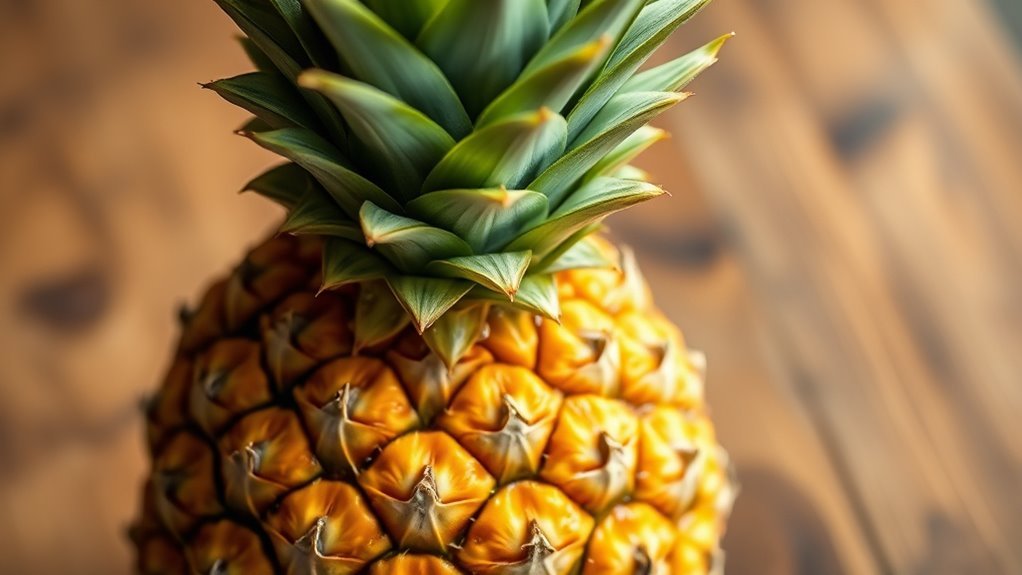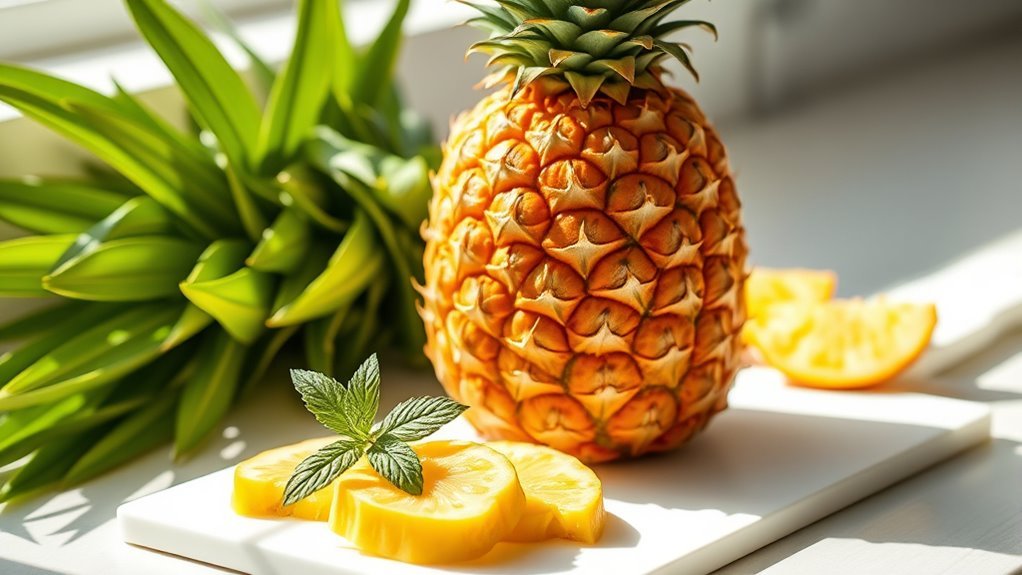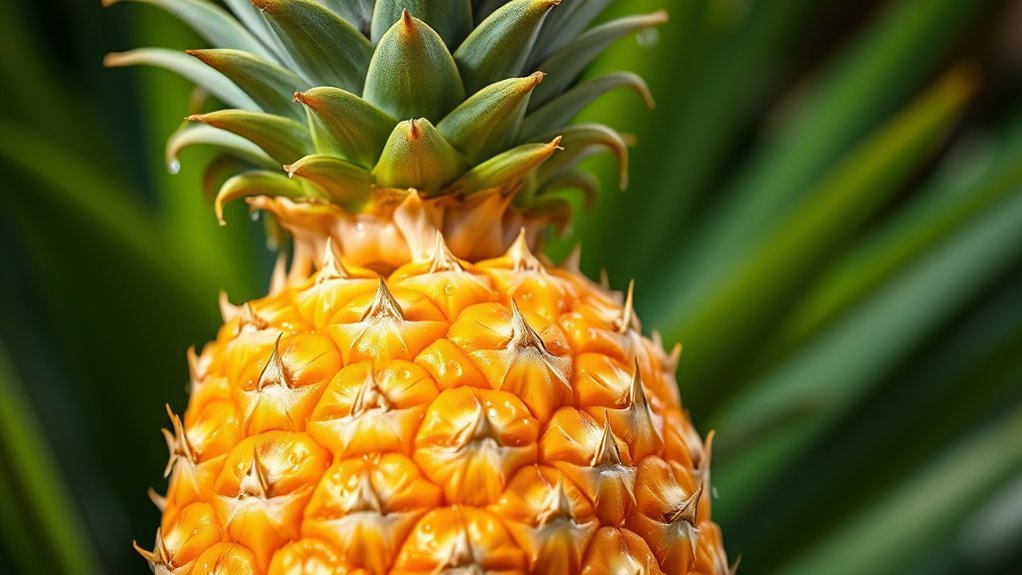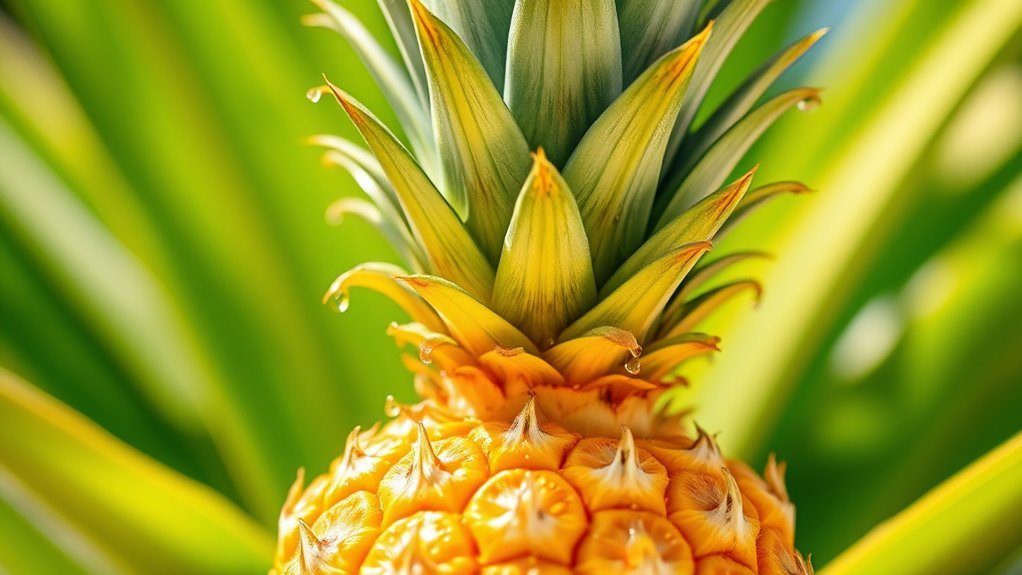Pineapples aren’t typically considered keto-friendly because of their high sugar and carb content, with about 21 grams of carbs per cup. This can disrupt ketosis if you consume more than your daily limit. While they do offer health benefits like vitamin C and bromelain, moderation is key to avoid spiking insulin levels. If you want to enjoy pineapple while on keto, knowing how to manage your intake is essential. Discover more about keto snacks and alternatives!
Understanding the Ketogenic Diet

When you plunge into the ketogenic diet, it’s essential to understand its core principles and how it alters your body’s metabolism. The ketogenic diet primarily focuses on high fat, moderate protein, and very low carbohydrates. This macronutrient shift pushes your body into a state of ketosis, where it burns fat for fuel instead of glucose. Different diet variations, like targeted or cyclical keto, allow for flexibility depending on your lifestyle and goals. It’s vital to choose the variation that fits your needs while adhering to the ketogenic principles. By understanding these fundamentals, you empower yourself to make informed decisions, enhancing your journey toward better health and metabolic freedom. Embrace the process, and enjoy the benefits that come with it.
Nutritional Profile of Pineapple

Pineapple, a tropical delight known for its vibrant flavor, boasts a unique nutritional profile that sets it apart from many other fruits. With various pineapple varieties available, each offers a slightly different taste and nutritional benefits. Generally, pineapples are rich in vitamin C, which supports immune function and skin health. They also contain manganese, essential for bone health and metabolism. Additionally, pineapples have bromelain, an enzyme that may aid digestion and reduce inflammation. While they provide important vitamins and minerals, it’s crucial to consume them in moderation, especially if you’re mindful of your carb intake. Overall, incorporating pineapple into your diet can offer health benefits, provided it fits within your nutritional goals.
Carb Count: Pineapple vs. Other Fruits

When it comes to carb content, pineapples are relatively high compared to some other fruits. For instance, a cup of pineapple contains about 21 grams of carbs, while berries like strawberries and raspberries are lower, often under 10 grams per cup. Understanding these differences can help you make informed choices if you’re following a keto diet.
Pineapple Carb Content
With approximately 21 grams of carbohydrates per cup, pineapples stand out among fruits, especially for those following a ketogenic diet. Their pineapple glycemic index is relatively high, making it essential to monitor your pineapple serving size if you’re aiming for ketosis.
Here’s a quick comparison of pineapple carb content with other fruits:
| Fruit | Carbs (per cup) |
|---|---|
| Pineapple | 21 grams |
| Strawberries | 13 grams |
| Blueberries | 21 grams |
While enjoying the sweet taste of pineapple, remember that moderation is key. If you’re committed to a low-carb lifestyle, balancing your fruit choices can help you stay on track without sacrificing flavor or variety.
Comparing Fruit Carbs
Understanding the carb content of various fruits is essential for anyone managing their diet, especially on a keto plan. While fruit sugars can be healthy, they also impact carb absorption. Here’s a quick comparison of pineapple’s carbs versus other fruits:
- Pineapple: Approximately 21g of carbs per cup
- Strawberries: About 11g of carbs per cup
- Blueberries: Roughly 21g of carbs per cup
- Avocado: Only 12g of carbs per cup
As you weigh your fruit choices, keep in mind how these carb counts affect your daily intake. Opting for lower-carb options can help you maintain ketosis while still enjoying the freedom that comes with a varied diet.
Health Benefits of Pineapple
Pineapple offers a range of health benefits that can enhance your overall well-being. Rich in pineapple antioxidants, this tropical fruit helps combat oxidative stress, potentially reducing your risk of chronic diseases. The presence of bromelain, an enzyme found in pineapple, supports digestion by breaking down proteins, making it easier for your body to absorb nutrients. This can be particularly helpful if you’re looking to improve digestive health. Additionally, pineapple is packed with vitamins and minerals, including vitamin C, which boosts your immune system. Incorporating pineapple into your diet can provide a revitalizing way to support your health while enjoying its delicious taste. Just remember, moderation is key, especially if you’re mindful of your carbohydrate intake.
How Pineapple Affects Ketosis
While enjoying the sweet taste of pineapple might be tempting, it’s important to reflect on how it fits into a ketogenic diet. Pineapple can greatly affect your ketosis, primarily due to its sugar content. Here are some key points to keep in mind about its ketosis impact and sugar metabolism:
- High Sugar Content: Pineapples contain natural sugars that can hinder ketosis.
- Carbohydrate Count: A cup of pineapple has around 21 grams of carbs, which may exceed your daily limit.
- Insulin Response: Eating pineapple can spike insulin levels, affecting fat-burning.
- Portion Control: If you choose to indulge, be mindful of serving sizes to minimize its impact on your ketosis.
Keeping these factors in mind can help you navigate your keto journey more effectively.
Moderation: The Key to Enjoying Pineapple
If you’re craving a taste of pineapple on your ketogenic journey, moderation is crucial to maintaining your goals. While pineapple can be higher in carbohydrates compared to other fruits, you can still enjoy it by implementing moderation strategies. Start by practicing portion control; a small serving of pineapple can satisfy your cravings without derailing your keto plan. Aim for a few chunks instead of a whole slice, and pair it with healthy fats, like coconut or avocado, to keep your meal balanced. Keep track of your carb intake to guarantee you stay within your limits. By enjoying pineapple mindfully, you can savor its tropical sweetness while staying committed to your ketogenic lifestyle. Remember, it’s all about balance!
Delicious Keto-Friendly Pineapple Recipes
Incorporating pineapple into your keto diet can be both enjoyable and rewarding with the right recipes. Here are some delicious options that keep your carb count in check while satisfying your taste buds:
- Keto Pineapple Smoothie: Blend unsweetened coconut milk, spinach, a small amount of pineapple, and ice for a revitalizing drink.
- Pineapple Salsa Recipe: Mix diced pineapple with avocado, cilantro, lime juice, and jalapeño for a zesty topping on grilled meats.
- Grilled Pineapple Skewers: Skewer pineapple chunks with chicken or shrimp, brush with olive oil, and grill for a sweet-savory delight.
- Pineapple Coconut Chia Pudding: Combine chia seeds, coconut milk, and a bit of pineapple for a creamy dessert.
These recipes allow you to enjoy pineapple without compromising your keto goals!
Alternatives to Pineapple on a Keto Diet
If you’re looking for alternatives to pineapple on a keto diet, there are plenty of options to contemplate. Low-carb fruits like berries, along with a variety of vegetables, can add flavor and nutrition without kicking you out of ketosis. Additionally, keto-friendly snacks can provide satisfying alternatives that keep your meals interesting and diverse.
Low-Carb Fruit Options
While pineapples are often celebrated for their tropical sweetness, they may not fit into a strict keto diet due to their higher carbohydrate content. Luckily, there are plenty of low-carb fruit options that you can enjoy without derailing your keto journey. Consider these alternatives:
- Berries: Strawberries, raspberries, and blackberries are all excellent low carb berries that are rich in antioxidants.
- Avocado: Technically a fruit, it’s high in healthy fats and low in carbs.
- Coconut: Fresh coconut or unsweetened coconut flakes can add flavor and texture to your meals.
- Lemon/Lime: Great for flavoring water or making keto fruit smoothies, they’re low in carbs and high in vitamin C.
These options can help satisfy your sweet tooth while keeping your carb count low.
Vegetable Alternatives
Though pineapples offer a delightful flavor, there are plenty of vegetable alternatives that can enhance your meals while keeping your carb intake in check on a keto diet. Zucchini noodles are a fantastic pasta substitute, while cauliflower rice makes a great base for stir-fries. For a hearty texture, consider grilled mushroom caps or eggplant slices. Bell pepper strips can add crunch to salads, and radish chips provide a satisfying snack. Cucumber rounds are invigorating and versatile, perfect for dips or as a crunchy side. Don’t forget avocado halves, which are rich in healthy fats and can complement various dishes. These options not only keep your meals exciting but also align perfectly with your keto lifestyle.
Flavorful Keto Snacks
Finding tasty snacks on a keto diet can be a challenge, especially when craving something sweet like pineapple. Luckily, there are plenty of keto snack ideas that can satisfy your cravings without kicking you out of ketosis. Here are some flavorful treats to contemplate:
- Coconut Chips – Crispy and naturally sweet, they’re perfect for munching.
- Dark Chocolate – Choose varieties with 85% cocoa or higher for a low-carb option.
- Cheese Crisps – Baked cheese provides a savory crunch that’s hard to resist.
- Berries – In moderation, raspberries and strawberries offer a burst of flavor without too many carbs.
These alternatives can keep your snacking enjoyable and compliant with your keto lifestyle, allowing you to indulge without guilt.
Frequently Asked Questions about Pineapples and the Keto Diet
1. Are pineapples keto-friendly?
Pineapples are generally not considered keto-friendly due to their relatively high carbohydrate content. A single cup of pineapple chunks contains approximately 21 grams of carbohydrates, which can significantly impact your daily carb limit on a ketogenic diet. While you can enjoy pineapples in moderation, it’s essential to account for the carbs and adjust your other food intake accordingly to stay in ketosis.
2. What is the carbohydrate content in pineapples?
A cup of fresh pineapple chunks contains around 21 grams of carbohydrates, including about 2.3 grams of fiber. When considering net carbs, which are total carbs minus fiber, that brings the effective carb count to around 18.7 grams per cup. This high carb content makes it challenging to fit into a strict ketogenic diet, where daily carbohydrate intake is often limited to 20-50 grams.
3. Can I include any pineapple in my keto diet?
Yes, you can include small amounts of pineapple in your keto diet if you carefully manage your overall carbohydrate intake. For example, adding a few chunks of pineapple in a smoothie or as a garnish can provide flavor without drastically increasing your carbs. The key is moderation and ensuring that your total carb intake remains within your daily limits.
4. What fruits are better alternatives to pineapples on a keto diet?
Better alternatives to pineapples on a keto diet include berries such as strawberries, blackberries, and raspberries, which are lower in carbs and higher in fiber. Avocados are also an excellent choice due to their healthy fats and low carbohydrate content. These fruits can provide sweetness and flavor without compromising your ketogenic goals.
5. What are the health benefits of pineapples?
Pineapples are rich in vitamins, minerals, and antioxidants, making them a nutritious fruit. They are an excellent source of vitamin C, which supports immune function, and bromelain, an enzyme that may aid digestion and reduce inflammation. While they may not fit seamlessly into a strict keto diet, incorporating them in moderation can still provide health benefits, especially if you can balance your overall carbohydrate intake.
References
- https://www.healthline.com/nutrition/keto-diet-foods#fruits
- https://www.verywellfit.com/is-pineapple-keto-friendly-4692572
- https://www.medicalnewstoday.com/articles/325346
- https://www.wellandgood.com/pineapple-keto-diet/
- https://www.ncbi.nlm.nih.gov/pmc/articles/PMC6470825/
- https://www.dietdoctor.com/low-carb/keto/foods
- https://www.eatthis.com/pineapple-keto-friendly/


